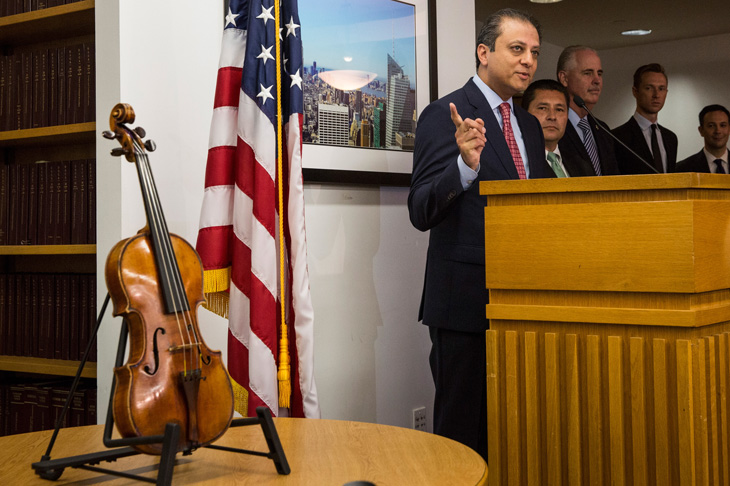Because I’d been reading about Stradivarius on the bus home, my helpful iPhone suggested a related story: the Totenberg Ames Stradivarius, stolen and ‘silent for decades’, was to be played again in concert.
Idly, on the hot top deck of the 38, I read on. Roman Totenberg, the celebrated Polish-American violinist, was 70 when his beloved Strad was taken back in 1980. He’d spent the evening playing Mozart at the Longy school of music in Cambridge, Mass, and when he left his dressing room to glad-hand fans, a former student slipped in and sloped off with the fiddle.
The police had their suspicions, but these were the days before CCTV and nothing could be proved — so the Totenberg Ames Strad sank into three decades of obscurity. It wasn’t until the penultimate par that the name of the student was mentioned. No big deal. No one you’ve heard of. Just a once-promising musician called Philip S. Johnson.
There are moments in life when a light shines suddenly backwards on the past. Phil Johnson, the violin thief, was my first love; the first bloke to really unsettle my icy little teenage heart. Quite unknowing, I’d listened to him play the Totenberg Strad for hours on end. Unknowing, I’d played it myself.
We met at the Spoleto music festival in Italy, Phil and I. He was 42 and I was 17 and my mother was horrified. He was standing in an open doorway playing the Sibelius violin concerto when my family, who went to the festival every year, trooped down to hear the midday concert in our crumpled linens, stopped and got to talking. It makes sense now that Phil was playing Sibelius out into the empty mid-morning street. In the flurry of articles written about him after the Strad was found, his Boston Uni peers remember him as the sort of guy who’d never play scales if he thought anyone was listening.
We met for a drink that night. Phil was exciting, erratic, amused by life. Sometimes he seemed paranoid — in retrospect, fair enough. Oddly, he set great store by authenticity. He said to my mother: ‘Who’d have thought I’d fall in love with a British school-girl?’ I still think this shows an attractive lack of guile. The next night we walked down to the aqueduct. Everyone at the Spoleto festival went to the aqueduct to snog. If you walked down the hillside path away from the town after 9 p.m., you could see the great bridge 100 metres high, looming pale across the valley, and the tiny moonlit limbs of half-dressed cellists flailing against the night.
What I didn’t know that summer in Italy was that Phil’s life pre-Spoleto had been so rough. After stealing the Strad in his twenties, Phil’s fortunes went downhill. Any fairy story would have warned him; any quick flick through Tolkien. An expert quoted in that article suggested that because the violin was in good nick when found, it had remained unplayed during its years on the lam. The thief had merely gloated, he deduced, Golem-like. Nonsense. The Totenberg Ames Strad went with Phil across the country when he was in his thirties and played any gig anywhere for cash. He played jazz for me on it during our week-long affair. A friend who later spoke to the Washington Post says Phil took great and tender care of his beloved violin, and often cleaned and repaired it.
The violinist who plays it now, Mira Wang, a protégé of Totenberg, said of her first encounter with the Strad: ‘When I got it, I truly thought the violin hated me. Great masterpieces like these they have their own character.’ I like to think it was missing Phil.
This weird new light changes other pieces of the past. Spoleto was Phil’s big chance, his midlife comeback, and he owed it all, I read, to Steven Mercurio, his old friend from university, then director of the festival. Phil had by then formed a trio, the Mobius trio, and Mercurio invited them to play for the week.
I had thought Mercurio insufferably vain. In the early 1990s I was horrid to him. But not only did he give his old pal a job — 20 years later, in 2011, when Phil was diagnosed with pancreatic cancer, the great maestro flew over to LA to help Phil make one last recording before he died. Phil wanted to play the Sibelius again, and he did. A farewell to the Strad.
Phil had talent. ‘He was a wild kid, but a natural,’ said his first teacher. He had a gift for improvisation, and in the service of music he felt quite free to break all conventions. He used speakers, reverb, effects. When the Mobius trio played Shostakovich in Spoleto, I felt, for the first time, all the horror of the holocaust. The one CD they recorded is extraordinary. I like to think that Roman Totenberg might cut Phil some slack in the musical afterlife for that.
Many years after that summer in Spoleto, Phil would call from time to time. I still felt the same thrill on hearing his voice — my mother still felt the same chill of maternal fear. In my first year at Edinburgh university, I played the Mobius trio’s recording of Shostakovich to my then great friend James Rhodes, who is now a concert pianist. To my surprise, he was electrified by it; he understood what I only dimly sensed. He took Phil’s number and over the next few years they spoke a bit. Both outsiders, both quite sure that there were different ways to make music, that conventions could be overturned.
Night after night we sat in my small room and chain-smoked and listened to Glenn Gould and to Phil. We were listening to that stolen Strad, but it wasn’t the violin that was extraordinary, it was Phil.
Got something to add? Join the discussion and comment below.
Get 10 issues for just $10
Subscribe to The Spectator Australia today for the next 10 magazine issues, plus full online access, for just $10.
You might disagree with half of it, but you’ll enjoy reading all of it. Try your first month for free, then just $2 a week for the remainder of your first year.















Comments
Don't miss out
Join the conversation with other Spectator Australia readers. Subscribe to leave a comment.
SUBSCRIBEAlready a subscriber? Log in